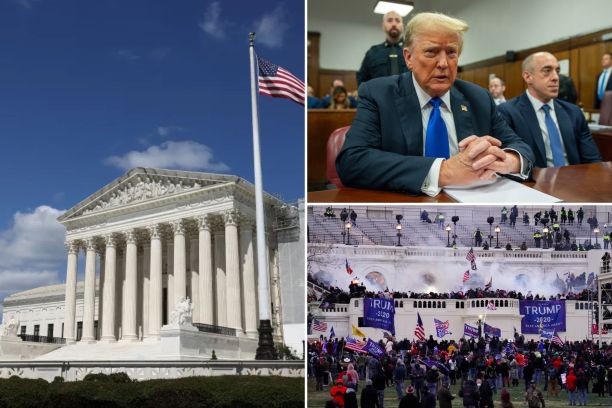Supreme Court Sides With Jan. 6 Defendant Against Obstruction Charge; Ruling Puts Federal Charges Against More Than 300 Defendants — Including Trump — in Jeopardy; Supreme Court Narrows Use of Obstruction Charge in Jan. 6 Cases, Affecting Trump and Hundreds of Other Defendants
Supreme Court sides with Jan. 6 defendant against obstruction charge:
Ruling puts federal charges against more than 300 defendants — including Trump — in jeopardy
The Supreme Court on Friday erased the conviction of a Jan. 6 protester whom prosecutors had charged with obstructing the Electoral College count, saying the government was stretching too far a law written to criminalize people who hindered an investigation.
The ruling is a victory for hundreds of protesters the Justice Department has charged under the obstruction law. It could even have implications for former President Donald Trump, who is facing his own federal obstruction charges related to attempts to submit alternate slates of electors in the 2020 election.
Federal prosecutors said the 2002 law, passed in the wake of the Enron accounting scandal and designed to capture conduct where someone ordered another person to disrupt a probe, applied to the Jan. 6 protesters since their demonstration at the Capitol sent lawmakers hurrying for cover and disrupted the Electoral College count for hours.
But Chief Justice John G. Roberts Jr. said the government misread the scope of the law.
“If Congress had wanted to authorize such penalties for any conduct that delays or influences a proceeding in any way, it would have said so,” the chief justice wrote.
He said to read the law otherwise would mean all sorts of common activities by lobbyists and activists who try to influence the government.
His ruling was joined by four other GOP-appointed justices and Justice Ketanji Brown Jackson, a Biden nominee.
Justice Amy Coney Barrett, a Trump appointee, penned the dissent, saying the way she read the law, Congress did intend to grant wide latitude to prosecutors.
“There is no getting around it: Section 1512(c)(2) is an expansive statute. Yet Congress, not this court, weighs the ’pros and cons of whether a statute should sweep broadly or narrowly,’” Justice Barrett wrote.
Attorney General Merrick Garland said he was disappointed in the ruling but vowed that those who took part in the Jan. 6 protest will still face justice.
“The vast majority of the more than 1,400 defendants charged for their illegal actions on January 6 will not be affected by this decision. There are no cases in which the [Justice Department] charged a January 6 defendant only with the offense at issue in Fischer,” he said in a statement. —>READ MORE HERE
Supreme Court narrows use of obstruction charge in Jan. 6 cases, affecting Trump and hundreds of other defedants:
Potentially upending scores of Jan. 6, 2021, Capitol riot prosecutions — including the case against former President Donald Trump — the Supreme Court on Friday narrowed the use of a charge of obstructing an official proceeding.
In a 6-3 decision that deviated from ideological lines high court concluded that prosecutors need to hang closer to the statutory language of the obstruction charge used in a slew of Jan. 6 prosecutions.
“The Government must establish that the defendant impaired the availability or integrity for use in an official proceeding of records, documents, objects, or as we earlier explained, other things used in the proceeding, or attempted to do so,” Chief Justice John Roberts wrote in the majority opinion.
At issue was a technical reading of the 2002 Sarbanes-Oxley Act, which was enacted in the aftermath Enron accounting fraud scandal.
It lays out criminal liability for that anyone who “alters, destroys, mutilates, or conceals a record, document, or other object, or attempts to do so, with the intent to impair the object’s integrity or availability for use in an official proceeding; or otherwise obstructs, influences, or impedes any official proceeding, or attempts to do so.”
Yet while the charge had been used in over 300 prosecutions pertaining to the Capitol riot, not all of those prosecuted on that charge actually tampered with official papers or other items.
Notably, that same charge was brought against Trump in August of last year by special counsel Jack Smith.
At issue before the high court in Fischer v. United States was a challenge from Pennsylvania resident Joseph Fischer, a former police officer whose lawyer argued that he didn’t necessarily destroy material like the language of the Sarbanes-Oxley Act stipulates.
The Supreme Court ruling instructs the lower courts to reevaluate Fischer’s case based on the majority opinion.
Roberts was joined by liberal Justice Ketanji Brown Jackson and four other conservative justices. Meanwhile, the other two liberals on the bench joined Justice Amy Coney Barrett in dissent. —>READ MORE HERE







Comments are closed.